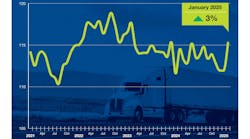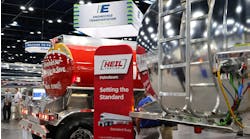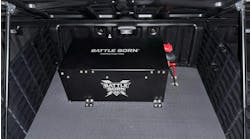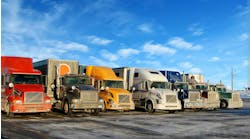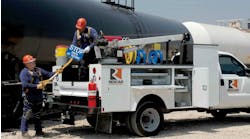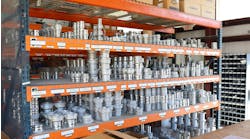ATA: Truck tonnage surges 3% in February
Dragonfly Energy unveils new power pack
Class 8 truck orders roll back in February
PSC expands railcar repair services
Transtex introduces next-generation eAPU
Report: Parts, labor costs fall in Q4 2024
Committed to clean: Cherokee chases foodgrade growth with newly JPA-approved tank wash
Legend has it that a Cherokee Freight Lines driver was polishing his truck’s wheels while waiting to offload sugar at a Los Angeles ice cream plant in the mid-1970s when the company’s president walked up, complemented his ride, and said, “Have your boss call me.” He had vegetable oil to haul—and appreciated a shiny tractor.
Gary Scannavino, Cherokee’s founder and longtime president, did call, and earned the ice cream company’s business—and that same attention-grabbing fastidious is ingrained in the foodgrade hauler’s DNA today. “Being in the food space, the image of our trucks goes a long way,” said Adam Karp, Cherokee vice president. “We constantly get complemented on the cleanliness of our trucks and tank trailers—and drivers take pride in keeping them clean.”
Cherokee’s top-down commitment to cleanliness continues to cultivate new business today.
The California-based company strengthened its service to the wine industry with its first wash rack, opened in 1991 in Stockton, and last year expanded its foodgrade capabilities with the construction of a state-of-the-art tank cleaning facility in Madera that boosted capacity, turnaround times, and most importantly, quality control.
“Everybody wants clear air, clean water—and clean food,” said facilities manager Richard Damilano, who joined Cherokee in 1973.
“So everything we do is all about food safety.”
Cherokee does it because it’s the right thing to do, Damilano insisted, and that’s why customers keep returning. Felipe Pineda, chief operating officer, said the family-owned, for-hire bulk carrier is aiming for 10% growth this year, despite ongoing supply-chain and inflationary challenges, thanks in large part to two recent developments—final Juice Products Association (JPA) certification at the Madera wash rack in April, and a new driver pay structure sealed in June.
“Now all the pieces are in place for us to start to accelerate that growth.”
Evolving operation
In addition to squeaky-clean equipment and facilities, comprehensive service, sustainable practices, and employee well-being are at the heart of Cherokee’s enduring success. The trucking operation Gary founded in 1966 now boasts 500 employees, 640 tank and dry van trailers, and 252 tractors, primarily serving wine and foodgrade customers in California, Oregon, Washington, Nevada, Idaho, Arizona, Utah, New Mexico, Colorado, and British Columbia, Canada.
Cherokee’s long-standing wine business comprises liquid tank-trailer transfers between crushing, bottling, and storage facilities; and the dry-van freight movement of glass bottles, packing materials, and finished products in the state that produces 95% of U.S. wine. On the foodgrade side, Cherokee transports a diverse array of bulk commodities, including liquid and granulated sugar, edible oils, and chocolate.
“The Scannavino family has developed and built and incredible business over the years, and it’s our responsibility to ensure Cherokee continues to grow for generations to come,” said Karp, a world champion racquetball player and International Racquetball Tour owner before joining Cherokee in 2018. That process includes diversification, technology upgrades, and building a talented team that can take Cherokee into the future.
Pineda says they provided the usual trucking and cleaning services pre-pandemic. With capacity constrained and equipment in short supply post-pandemic, customers are inquiring about leasing, power-only, and other innovative equipment options—and Cherokee made its name by responding to customer needs. “Now we’re looking to support them in different ways. From a dedicated full-service solution to driver leasing, we want to be there to support our customers any way we can,” Pineda said. “We want to expand our footprint within our current customer base.”
To support their shipping needs, Cherokee recently rolled out a new customer portal for accessing real-time tracking, bill of lading access, load histories, and more, enabled by McLeod Software. “That’s a big piece,” Pineda said. “All our customers want to know, ‘Where’s the truck, and what time will you be there?’ So now we’re providing those options.” In addition, Cherokee is integrating its software with customers’ systems through electronic data interchanges that transmit data directly to their home networks. “Transparency is a big thing for our customers,” Pineda said. “They want data immediately, so we share that information from our trucks through our customer portal.”
Pineda’s also looking for ways to leverage prolific data for expansion—but the greatest potential for growth is in food products, and particularly with concentrates in a region filled with juice producers. That’s where the new Madera wash rack—and long-awaited JPA certification—come in, accelerating business development. “Building a second wash facility at our Madera location was extremely important to our future,” Karp said.
“If we don’t have available wash capacity, we’re limited on what we can do for customers.”
Expanding capacity
Cherokee’s original Stockton wash facility contains four bays, but two are outdoor “clean-in-place” bays for washing out wine trailers. With only two indoor foodgrade bays, they didn’t have space to scale foodgrade cleaning; and the four total bays weren’t sufficient to clean all its trailers fast enough, forcing Cherokee to rely on commercial facilities, where they can’t control wait times. “We were getting stagnant on our load counts and couldn’t expand our network because we were so dependent on outside washes,” Pineda said.
In response, owner Leanne Scannavino, Gary’s widow who’s helped lead the company since 1971, decided to establish a second tank wash at Cherokee’s existing Madera location in late 2019. Work commenced the following year, and the concrete slab was poured that summer, with the goal of opening in November 2020. But COVID-19 complications delayed opening until May 3, 2021. And even then, Cherokee ramped up slowly while awaiting final inspections, and JPA approval.
But the final result was worth the wait—for Cherokee and its customers.
The 9,900-square-foot building boasts four drive-through bays, with two for wine and two for foodgrade, doubling the company’s cleaning capacity; and state-of-the-art equipment, capabilities, and technology, including Ignition’s advanced industrial automation platform that allows operators to log in remotely, track processes, and diagnose problems. The multi-million-dollar investment, which included paving 12 of the property’s 20 acres to keep gravel out of bays, enables expansion now—and for decades to come.
“When we bring in customers to tour the facility, they’re constantly in awe of what we’ve built,” Karp said. “We’ve heard comments like, ‘Now we’re going to have to hold some of these other wash facilities to the same type of a standard,’ because with food safety getting increasingly stringent, some wash facilities are having a tough time keeping up with the requirements coming in from the food safety regulations.
“We have the ability to meet the most stringent safety requirements.”
Regular audits prove it. Cherokee scored a 935 on a 1,000-point scale in AIB International’s recent review of processes at its Stockton wash facility. “We pass those with flying colors every year,” Pineda said. Some customers now accept the AIB audits for their internal records. Others still conduct their own inspections. Cherokee also performs regular maintenance, and swabs tank surfaces daily for evidence of bacteria. Both wash facilities are Kosher certified, and Madera completed JPA certification April 25. “With our new state-of-the-art wash facility and these certifications, we’ll be able to meet customer needs for years to come,” Karp said.
Madera cleaned approximately 4,000 foodgrade and 6,000 wine trailers the first year. Stockton averages 9,000 foodgrade and 7,500 wine washes annually.
Growing together
Adding JPA-approved cleaning capacity is only the latest strategic adaption by a trucking family with deep roots in local industry.
Al Scannavino, Gary’s father, started Al Scannavino Trucking back in 1946 as a hauler of fruits and vegetables to canneries, and cattle. The family moved into wine products as tree crops like grapes replaced traditional “row” crops. “There’s a lot more money in trees than tomatoes and beans, so the row crops went away,” recalled Damilano, who went to high school with Gary at Saint Mary’s in Stockton. After Gary started Cherokee, he entered the food products business with help from Spreckels Sugar, which asked him to take over a contract hauling sugar to its plant in Northern California, work previously managed by Arizona Pacific.
“We grew along with them by responding to their demands,” Damilano said.
Gary took over Al Scannavino Trucking after Al died in 1972 and operated both companies—with help from his wife, and their family and friends—until his death in 2006, when Leanne assumed full ownership. She and VP Jack Riella, Gary’s cousin, continued to operate Al Scannavino Trucking until the last driver retired in 2018. “It’s always been a family-run operation and always will be,” said Karp, who’s married to Leanne’s daughter, Angela. Leanne’s son Albert also runs a separate company called Scannavino Trucking that does some sub-hauling for Cherokee.
“There’s a lot of history here,” Damilano said. It extends to many long-time employees. Damilano is aiming for 50 years next year, and brothers Manuel and Frank Telles are approaching 40 years. Manuel is the general manager over both terminals, Frank oversees both wash racks, and neither has considered leaving. “They treat us like we’re family, too,” Manuel said. That’s why their safety-focused leaders are equally committed to providing employees with top-notch equipment and facilities, and customers with first-rate service.
Cleaner equipment
Cherokee consulted with customers and toured other facilities before designing and building its Stockton wash rack. Then it applied three decades’ worth of tank-cleaning experience to the Madera facility’s design, with help from Wagner Mechanical and Automation Group. “We learned what works, what doesn’t, how important it is to coat the floor, so water doesn’t delaminate the surface, and so on—and then added features that weren’t available 30 years ago,” Damilano said.
The Stockton facility primarily relies on one 100-horsepower Cleaver-Brooks boiler. At Madera, Cherokee selected two 50-hp steam boilers from McKenna, keeping them under a key California Air Resources Board (CARB) emissions threshold, and ensuring they always have one unit functioning if the other is down for maintenance or repair. “We’re never dead in the water,” said Luis Gama, Madera terminal supervisor.
The high-efficiency, JFS Series McKennas are two-pass, dry-back horizontal firetube boilers with high-density fiberglass insulation; front-mounted exhaust stacks; and solid-state combination pressure control, automatic operational control, and high-limit manual reset control that come completely wired, piped, and tested for multiple fuel configurations, making installation convenient, according to McKenna.
Madera also boasts two 2 million-BTU Camus Dynaforce Series boilers with heat exchangers for pre-heating water. “They keep the 15,000-gallon freshwater tank at 150 degrees (Fahrenheit), so when you start the cleaning process, and you’re injecting 150-degree water through the steam boiler, and the water goes through the heat exchanger, all it has to do is ramp up 30-35 degrees, and you’re over 185-190. We also have another heat exchanger, and when you ramp it up, the water will get up to 208 for JPA washes.”
Foodgrade cleans, delivered by rotating four-nozzle, high-pressure Lechler sprayers, include JPA-approved soaps and sanitizers; and Madera boasts dual cleaning capabilities, with a single-pass system for JPA washes, and a recirculating system to clean out oils and other compatible commodities. Every wash finishes with fresh water. “In California, we try to save as much water as we can, but certain washes don’t allow it,” Frank said.
Sustainability, and safety, are further boosted by electric motors that power the Unibloc pumps for cleaning while trucks are indoors. Cherokee previously used its trucks’ PTOs for cleaning out pumps and Capital Rubber hoses. “The trucks used to run all the time in the Stockton facility, so we installed exhaust fans,” Frank explained. “At one point we had four exhaust fans in Stockton, and then eight, but we were still producing emissions. Now all the trucks are shut off throughout the cleaning process, eliminating the exhaust and providing a quieter, safer working environment for the team.”
Foodgrade fleet
Cherokee’s trailer fleet includes 191 foodgrade tank trailers, 132 wine tanks, 305 dry vans, and 12 curtain-sided Utility doubles for hauling racked wine barrels into smaller wineries, where longer vehicles are difficult to maneuver. The company recently added eight tank trailers and 30 Wabash dry vans to support growth.
West-Mark, a California-based tank truck and trailer manufacturer, supplies Cherokee’s wine trailers, and all of the carrier’s custom-spec’d chocolate and vegetable oil trailers, which feature in-transit heat, Ridewell lift-axle kits, Pressure Systems International (P.S.I) tire inflations systems, and WABCO disc brakes. Cherokee’s newest 43-foot, tandem-axle wine trailers feature 6,800-gallon, three-compartment (3,300, 1,000, and 2,000 gallons) tanks for transporting smaller batches or different types of wine. The 6,800-gallon chocolate trailers feature 12-gauge, T-304 stainless steel tanks and three Girard Equipment manholes.
Foodgrade Walker and Brenner trailers round out Cherokee’s tank fleet. The 5,200-gallon Walkers transport sugar, and the 6,800-gallon Brenners carry vegetable oil. The Walkers feature foodgrade manholes from Betts Industries, Hendrickson disc brakes and tire inflation systems, and Alcoa wheels. The Brenners boast B.T.I. outlet valves, Hendrickson suspensions with Walther Dura-Light hubs, and Cooper tires.
New-purchase power units—in Cherokee’s signature yellow and brown—are Freightliner Cascadia daycabs for regional use and Kenworth T680s with 76-inch sleepers and refrigerators for interstate work. But with supply-chain disruptions and inflation, they’re harder to come by—and more expensive. Cherokee only recently received the Cascadias, originally slated for delivery late last year; and it ordered the T680s with 15-liter Cummins ISX engines because the lighter 13-liter engine wasn’t available, forcing it to look elsewhere for lightweighting. “The costs are skyrocketing,” Manuel lamented. “We typically paid around $150,000 for a truck last year, and now the ones we have coming in later this year and early next year are pushing $200,000.”
Neste’s low-carbon My Renewable Diesel, adopted in 2018, helps Cherokee save money on fuel and diesel particular filter (DPF) maintenance, which is good because per-mile costs are rising as Cherokee is forced to run some trucks past preferred trade cycles. “Right now, we’ve got a few trucks pushing 1 million miles because we can’t get new ones in fast enough to replace older equipment like we want to,” Manuel said.
Dedicated drivers
Of course, premium facilities and equipment aren’t helpful without someone who’s well-qualified to operate them. As Manuel points out, “at the end of the day, we can do everything right in the office, but we still need drivers to grow.”
To help secure Cherokee’s supply, leaders opted to protect the WBENC-certified Women’s Business Enterprise from any potential impacts of California’s Assembly Bill No. 5 (AB5) independent-contractor legislation by ceasing to use owner-operators in late 2019. So the company, which had 27 at the time, offered each a job, and to buy their vehicles, and 17 accepted. Cherokee can manage training more effectively now, too, Pineda asserted. “We can offer better service with our own drivers—and put a safer product on the road.”
Cherokee also finalized a new three-year collective bargaining agreement with its all-union driver workforce on June 11 that Karp says clarifies compensation, replacing an activity-based “factor” system with a more straightforward hourly pay rate, in addition to “amazing” benefits and “aggressive” retirement options, including a company-matched 401K or union pension, which he contends boosts retention. “Now we have an extremely competitive total package to offer drivers. It’s easy to explain, and for them to understand, which was not the case with the previous structure,” Karp said.
Fully committed
Cherokee isn’t done transforming its operation for the longhaul either.
The foodgrade carrier plans to roll out an automated wash ticket process early next year; and it’s currently upgrading the forward- and rear-facing cameras in the trucks with a new SmartDrive system, and growing interstate business with new routes to Texas, and new leads in Missouri and Wisconsin. “Cherokee isn’t sitting by the wayside,” Pineda said.
“We’re still looking to grow, and adding a wash rack only builds on the work we’ve done the last two years to put us in this position.”
One thing won’t change: Cherokee’s concern with cleanliness. Attention to detail—from the immaculate interiors of its stainless-steel tanks to the well-shined wheels on its trucks—remains an essential characteristic.
Just as it was 50 years ago.


